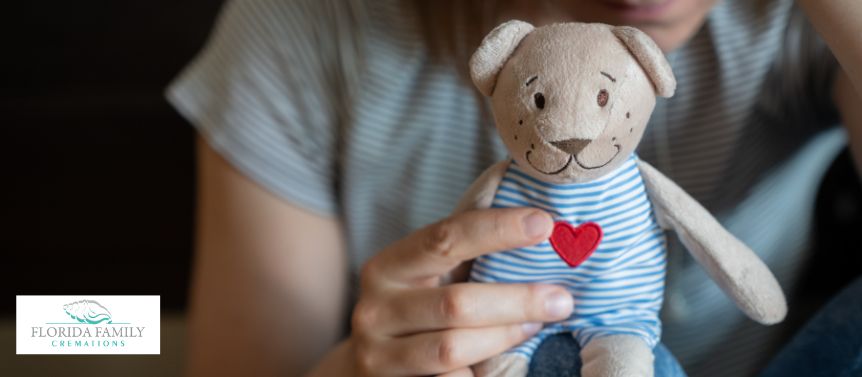For children, losing a loved one can be confusing and overwhelming. Grief counseling for children provides the tools and support needed to help young minds process these emotions. By using age-appropriate explanations and compassionate strategies, parents and caregivers can guide children through the complexities of loss and cremation.
In this guide, we’ll explore helpful strategies for discussing loss with children and offer insights into grief counseling for children. These approaches aim to support young people in navigating the difficult emotions that accompany loss.
Why Children Benefit from Grief Counseling and Support
Children grieve differently from adults, often moving in and out of feelings of sadness, confusion, and anxiety. They may ask questions repeatedly, show changes in behavior, or have trouble understanding concepts related to death and cremation. Special support can help children make sense of these new emotions, feel secure, and develop healthy coping mechanisms.
Understanding a child’s age, developmental stage, and unique personality is essential for providing the right kind of support. While young children may need simple explanations and reassurance, older kids may seek more detailed answers about death, cremation, and what happens after we lose someone.
How to Talk About Death and Cremation with Children
Explaining death and cremation requires sensitivity and age-appropriate language. Here are some strategies for approaching these conversations:
1. Use Simple, Direct Language
For younger children, it’s best to use straightforward language. Avoid using euphemisms like “gone” or “asleep,” which can confuse them and lead to misunderstandings. Instead, use terms like “died” or “passed away,” and explain that when someone dies, their body stops working.
When explaining cremation, you might say: “After someone dies, some families choose to have a process called cremation. This is a way of taking care of their body by turning it into ashes, which we can keep in a special place or scatter somewhere meaningful.”
2. Be Honest but Reassuring
Children can often sense when something is being hidden from them. Honesty helps build trust and provides clarity, but it’s also important to reassure them. Acknowledge that it’s okay to feel sad or confused and let them know that you are there to support them through it.
You can say, “I know this is hard to understand, and it’s okay to have questions. I’m here to answer your questions and be with you while we go through this together.”
3. Let Children Lead with Their Questions
Children may have many questions, or they may remain silent at first. Follow their lead, answering questions honestly and gently. If they ask, “Where is Grandma now?” a response could be, “People have different beliefs about what happens after we die. Some people believe in heaven, others believe in the spirit staying with us. What do you think?” This gives them a chance to express their thoughts and allows you to gently share your beliefs.
Encouraging questions helps children feel safe, supported, and involved in the grieving process. If they ask about cremation specifically, explain it in simple terms that match their level of understanding.
How Grief Counseling for Children Helps Navigate Loss
Understanding and processing emotions is challenging for children, especially during grief. Providing emotional support helps them work through their feelings and fosters resilience.
1. Validate Their Feelings
Let children know it’s okay to feel a range of emotions, from sadness and anger to confusion and relief. For instance, you might say, “It’s okay to feel sad or angry. Everyone feels different things when they lose someone, and all those feelings are normal.”
Validating their emotions shows that it’s okay to express how they feel, helping them feel understood and supported.
2. Encourage Healthy Expression of Grief
Children benefit from having ways to express their grief, whether through talking, drawing, or engaging in activities that help them remember their loved one.
- Journaling or Drawing: Encourage children to write or draw how they feel. This can be a safe way for them to express emotions that might be hard to verbalize.
- Memory Activities: Create a memory box together with items that remind them of their loved one, or plant a tree in memory of the person who passed.
- Physical Activity: For some children, engaging in physical activity like playing outside or taking a walk can help release tension and process emotions.
These activities provide outlets for grief, helping children channel their emotions in positive, constructive ways.
3. Offer Comfort and Reassurance
Loss can make children feel insecure or worried about losing others. Offering physical and emotional reassurance can help them feel more secure. Give plenty of hugs, spend extra time together, and remind them that they are safe and loved.
It’s also helpful to maintain regular routines, such as meal times and bedtime rituals, to give children a sense of stability and normalcy in a time that feels uncertain.
When to Seek Professional Grief Counseling for Kids
Sometimes, children need additional support beyond what family can provide. Grief counseling for children is designed to help young people process difficult emotions in a safe, supportive environment with trained professionals.
Consider seeking grief counseling if a child:
- Shows intense or prolonged symptoms of sadness, anxiety, or anger
- Begins withdrawing from friends or family members
- Has trouble sleeping, eating, or concentrating
- Expresses feelings of guilt or blame
- Has difficulty processing their feelings despite family support
Grief counselors are trained to work with children at different developmental stages, offering coping strategies and emotional support tailored to their unique needs.
Helping Children Honor and Remember Their Loved Ones
Honoring the memory of a loved one can be a comforting part of the healing process for children. Encourage children to share memories or think about ways they want to remember the person who has passed.
- Create a Memory Book: Include photos, drawings, or special mementos that remind them of their loved one.
- Light a Candle Together: Light a candle in memory of the person, sharing stories or expressing thoughts aloud.
- Participate in Family Rituals: Invite children to participate in family memorial rituals, like visiting a favorite place or celebrating the loved one’s birthday.
These rituals provide a way for children to express their love and stay connected to the memory of their loved one, which can be a source of comfort as they continue to process their loss.
Contact Florida Family Cremations to Pre-Plan Cremation
Talking to children about loss and cremation can feel overwhelming, but with honesty, patience, and age-appropriate explanations, you can provide them with the support they need. By listening to their questions, validating their feelings, and offering outlets for grief, you help them navigate these challenging emotions. Sometimes, professional grief counseling for children may be beneficial, providing additional tools and support.
At Florida Family Cremations, we understand how difficult it can be to help children cope with loss, and we are here to provide resources and guidance for families during this time. Remember, it’s okay to seek support, and you don’t have to go through it alone.
Contact Florida Family Cremations today about grief counseling service options in Clearwater.

